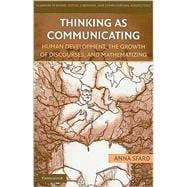
Note: Supplemental materials are not guaranteed with Rental or Used book purchases.
Purchase Benefits
Looking to rent a book? Rent Thinking as Communicating: Human Development, the Growth of Discourses, and Mathematizing [ISBN: 9780521161541] for the semester, quarter, and short term or search our site for other textbooks by Anna Sfard. Renting a textbook can save you up to 90% from the cost of buying.
| Series Foreword | p. xi |
| Introduction | p. xiii |
| Acknowledgments | p. xxi |
| Discourse on Thinking | |
| Puzzling about (Mathematical) Thinking | p. 3 |
| The Quandary of Number | p. 4 |
| The Quandary of Abstraction (and Transfer) | p. 9 |
| The Quandary of Misconceptions | p. 16 |
| The Quandary of Learning Disability | p. 22 |
| The Quandary of Understanding | p. 27 |
| Puzzling about Thinking - in a Nutshell | p. 32 |
| Objectification | p. 34 |
| What Is Research and What Makes It Ineffective? | p. 35 |
| Metaphors as Generators of New Discourses | p. 39 |
| The Metaphor of Object | p. 42 |
| The Gains of Objectification | p. 51 |
| The Traps of Objectification - the Case of the Discourse on Thinking | p. 56 |
| Objectification - in a Nutshell | p. 63 |
| Commognition: Thinking as Communicating | p. 65 |
| Monological and Dialogical Discourses on Thinking | p. 65 |
| Disobjectification of Discourses on Thinking - Brief History | p. 68 |
| We Are Almost There: Participationism | p. 76 |
| Finally: Thinking as Communicating | p. 80 |
| Thinking as Communicating - in a Nutshell | p. 91 |
| Thinking in Language | p. 94 |
| The Dilemma of Relation between Thinking and Speaking | p. 95 |
| Commognizing in Language | p. 101 |
| What Are the Properties of Commognition That Recursivity Makes Possible? | p. 109 |
| Human Development as the Development of Discourses | p. 115 |
| Thinking in Language - in a Nutshell | p. 123 |
| Mathematics as Discourse | |
| Mathematics as a Form of Communication | p. 127 |
| What Makes Mathematical Discourse Distinct | p. 129 |
| Challenges to Mathematical Communication | p. 135 |
| Visual Mediation in Mathematical Communication | p. 146 |
| Visual Realizations of Mathematical Signifiers | p. 154 |
| Mathematics as a Form of Communication - in a Nutshell | p. 160 |
| Objects of Mathematical Discourse: What Mathematizing Is All About | p. 163 |
| Mathematical Objects | p. 164 |
| Historical Development of Mathematical Objects | p. 174 |
| Individualization of Mathematical Objects | p. 177 |
| Challenges of Object Construction | p. 182 |
| Objects of Mathematical Discourse - in a Nutshell | p. 192 |
| Routines: How We Mathematize | p. 195 |
| Meaningfulness from Repetition | p. 195 |
| Rules of Discourse | p. 200 |
| Routines | p. 208 |
| Routines and Creativity | p. 216 |
| Routines - in a Nutshell | p. 220 |
| Explorations, Deeds, and Rituals: What We Mathematize For | p. 222 |
| Explorations | p. 223 |
| Deeds | p. 236 |
| Rituals | p. 241 |
| Development of Routines | p. 245 |
| Explorations, Deeds, and Rituals: What We Mathematize For - in a Nutshell | p. 259 |
| Looking Back and Ahead: Solving Old Quandaries and Facing New Ones | p. 261 |
| Looking Back: What Has Been Done | p. 262 |
| What Happened to the Old Quandaries | p. 263 |
| What Happened to Research on Thinking and Human Development | p. 275 |
| Some Implications for the Practice of Teaching and Learning | p. 280 |
| Looking Ahead: Facing New Question (and New Quandaries?) | p. 289 |
| Looking Back and Ahead - in a Nutshell | p. 292 |
| Glossary of Commognition | p. 295 |
| References | p. 303 |
| Name Index | p. 319 |
| Subject Index | p. 322 |
| Table of Contents provided by Ingram. All Rights Reserved. |
The New copy of this book will include any supplemental materials advertised. Please check the title of the book to determine if it should include any access cards, study guides, lab manuals, CDs, etc.
The Used, Rental and eBook copies of this book are not guaranteed to include any supplemental materials. Typically, only the book itself is included. This is true even if the title states it includes any access cards, study guides, lab manuals, CDs, etc.